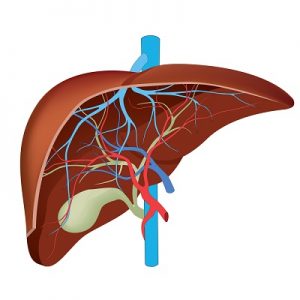 The liver is the largest gland organ in the human body.
The liver is the largest gland organ in the human body.
It secretes a fluid called bile which is necessary for digesting fats so that they can be easily absorbed by the intestine. It has an average weight of 3 pounds and is located in the upper right area of the abdomen, just underneath the diaphragm and to the right of the stomach. It receives 1.5 quarts of blood every minute through the portal vein and hepatic artery.
Within the liver are tiny cells called hepatocytes which are mainly responsible for the hundreds of functions of this gland in the body. Aside from producing bile for fat breakdown, below are the functions of a robust liver in maintaining a healthy human body.
Carbohydrate Synthesis
The liver plays a vital role in the metabolic synthesis of carbohydrates. A well-functioning liver can synthesize 100 grams of glycogen through the process of glycogenesis for carbohydrate metabolism. It is also responsible for the production of glycerol which is necessary for the synthesis of glucose by breaking down fat cells.
Protein Metabolism
The liver is also responsible for the metabolism of protein. It produces clotting factors like the fibrinogen, prothrombin, and anti-thrombin. It is also the main site for the red blood cell production of fetuses.
Lipid Metabolism
The liver produces bile that breaks down cholesterol through the process of lipogenesis. It is also involved in the production of triglycerides as well as other lipoproteins.
Storage
It stores different substances such as glycogen, Vitamin D, A, K, and B12. It stores iron and copper as well.
Detoxifies Blood
The liver also helps rid harmful substances in the blood such as drugs and alcohol. When we drink alcohol, eat a poor diet full of processed and fast foods, or take a lot of medicines, our liver is working non-stop to detoxify our blood from the harmful substances. The liver filter can also remove a wide variety of contaminants like fungi, bacteria, virus and parasites in the bloodstream so they don’t build up in the blood and cause health problems.
Destroys Old Red Blood Cells
Old red blood cells go to the liver to get destroyed and eliminated through the digestive system as waste. The liver cells are separated by spaces that act as a filter. Blood flows through the filter, which removes old blood cells, chemicals, drugs as well as other harmful substances from the body. This filter is called the sinusoidal system and is carried out by specialized cells called Kupffer cells which have the ability to break down toxic substances.
Produces Angiotensinogen
Angiotensinogen is a hormone that raises the blood pressure once activated by an enzyme called renin, which is released by the kidney. If the liver is not functioning well, elevated blood pressure may be experienced.
Produces Albumin
Albumin is a protein found in the blood serum and it is important in maintaining the oncotic pressure and transporting of the steroid hormones and fatty acids.
Removes Chemical Toxins
There are more than 1,000 toxins that are found in the food, water, and even air that we take in. All of these can cause harm to our body. Our liver is one of our first lines of defenses and it renders these chemicals inert by breaking them down and turning them into waste that is eliminated as urine or feces.
The liver contributes to a lot of functions within the body, so it is important to maintain the healthy state of homeostasis. Unfortunately, many people suffer from liver diseases over time due to their lifestyle and habits.
This is why it is so important to have a natural, drug-free, liver detox regularly so you give your liver a break. (Especially if you eat processed and fast foods on a regular basis.)






